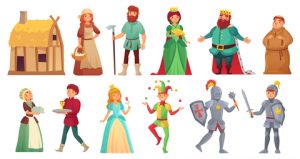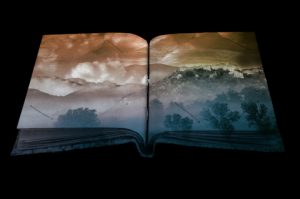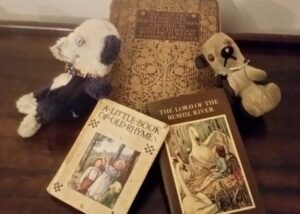Posts by Juliet Marillier
Yesterday I wrote those deeply satisfying words, The End. At least, metaphorically I did. I had reached the last words of the last chapter of my current work in progress, the second book in the historical fantasy series, Warrior Bards. It felt pretty good to be finished after months and months of work. I posted something on my Facebook author page to the effect, and readers shared my delight at reaching the milestone. I let them know that at around 155,000 words the manuscript was well over the contracted length and that my next step will be a rigorous edit and polish, including making major cuts before I submit it to the publishers.
Some readers were disconcerted, and I got a few questions about why I need to comply with a requirement to stay within a certain word count. Back when I started off as a published writer (twenty years ago now) my publishers were happy to accept a longer fantasy novel – my longest was a whopping 220K – and some of my most loyal readers find it surprising that what was acceptable in 1998 is considered too long now. One possible explanation is that publishers believe reader attention spans have dwindled with the rise in digital technology. Another is that bigger books are more expensive to publish. At one stage I was told that longer books don’t fit on the display shelves in one of the major retail outlets in the US (I have been unable to verify this!)
Harder to explain to readers was the fact that the manuscript simply isn’t ready to go to the publisher in its current form, despite the months of work I have put in and the many revisions I have already done. This isn’t a first draft. As I write, I stop after around three chapters and revise. Then I write the next three chapters and revise the whole thing. And so on until the last few chapters, which more or less write themselves. That means the earlier parts have been thoroughly edited by the time I reach the end. Yes, I’m way over at the plotting and planning end of the spectrum.
My previous novel, The Harp of Kings, underwent a painful editorial process which I have blogged about before. It, too, was over-long in its initial form. Even after I had performed my own pre-submission edit, it had some major flaws that were pointed out by my editors at the publishing house, firmly but kindly. Their structural report was even lengthier than usual. I took a good hard look at it and found i agreed with them on most points. I did the work, which involved a major rewrite, and resubmitted. The proof of the pudding will be after that book is published in September, but advance reviews have been extremely promising, and I know it is a much better book for its painful reworking. What did I learn from that?
Read MoreI had fun today making a voice recording of the character names for my forthcoming audiobook, Beautiful, which is based on the Nordic fairy tale East of the Sun and West of the Moon. This was to assist the narrator, who will be recording the book this month. As I got my tongue around Bjalta, Gudolf and Solvej, I decided the topic of character names deserved a revisit. As a writer of historical fantasy, I love to discover or create names that will not only suit individual characters, but will be appropriate to the world and culture of the story. Naming your characters well helps you to create the consistent, convincing world all fantasy writers strive for – the world that your reader can believe in from the first page.
Of course, clever naming enhances any genre of fiction. How could Gabriel Oak be anything but trustworthy, a man close to nature? Bathsheba Everdene suggests an unconventional, strong-minded woman – perhaps Katniss Everdeen shares some of her characteristics. Wackford Squeers is a sadistic man, Philip Pirrip (Pip for short) is an innocent. And what about Severus Snape, Albus Dumbledore, Luna Lovegood and countless other characters from the Harry Potter books? The naming style used by Dickens and Hardy suits J K Rowling’s fantasy well, providing consistency and humour.
When you’re writing historical fantasy, by which I mean either a story set in real world history but with supernatural elements, or a story set in an invented world that is based on a ‘real world’ period and culture, effective naming starts with a knowledge and love of your historical period (or the implied period.) Sure, you’re not writing a history book or even historical fiction, you’re playing with history. But that doesn’t mean anything goes. Newbie writers sometimes mix periods, cultures and languages freely when creating their world, and that can create jarring notes for the reader. A solid knowledge of your historical period and culture, including an understanding of language and naming, will help you to build a convincing world complete with whatever magical elements your imagination chooses to weave in. Hands up who’s been guilty of giving a character an anachronistic name? I’ve done that, but I won’t do it again. Remember the golden rule for fantasy writers: your world should be internally consistent. Names should match the implied period and culture. If you choose to depart from that, make sure you do so consistently and for a reason that makes sense within the rules of your world. The reader needs to know you’ve done it by choice, not sloppiness.
But wait, I hear you say. Isn’t this rather a rigid approach? Most readers won’t care about all this. They just want to be entertained.
Read MoreAs a reader of fiction, I appreciate historical accuracy. A novel with a historical setting, whether that be Tsarist Russia or Feudal Japan or the South America of the Inca, can spring to life for the reader when the author has a genuine passion for the period and culture. To my mind, the same thing applies with a work of historical fantasy, the genre I write in.
Historical fantasy could be loosely grouped into two categories (with many interesting sub-divisions, as in most genres.) There are stories set in real world history and geography, but with some elements of the uncanny or supernatural that set them apart from straight historical novels. Those elements may be based on the folklore and mythology of the time and place, as is the case in most of my own work, or the work might be alternative history – that is, the world as we know it changed by past events taking a slightly different course. Then there are stories set in imagined or secondary worlds, but loosely based on historical periods and cultures in the real world. In the first kind of story, good research is necessary, not only to get the historical overview right, but also for the accuracy of the everyday: What would they be eating? What would they be wearing? What animals would they keep? How would they get around? Then there’s culture: hierarchies in church, state and family, gender roles, attitudes to difference, norms of communication and behaviour. Ideally, this kind of historical fantasy would be as well-researched as a good historical novel. The author might also need to delve into folk beliefs, myths and legends.
If a story is set in an imagined world, the author has more flexibility. Some might say, ‘It’s a fantasy world – you can write whatever you like!’ By all means try this, fledgling writers. You will soon discover two basic rules. Firstly, there’s one thing the world of your book absolutely must have: internal consistency. Everything about your story must make logical sense within your created world, and that includes supernatural events and characters. Secondly, a writer will almost always draw upon the real world to some extent when creating a fantasy world. The secondary world will generally have some elements in common with the world the readers know, contemporary or historical, but will possess intriguing differences because fantasy deals in the uncanny, the magical, the supernatural. A good writer puts all this together seamlessly, so the reader believes in the world from the first page.
Some writers think outside the box when undertaking this challenge. I’ve written before about some intriguing novels in which the authors use characters from classic fiction as their protagonists. This approach requires not only meticulous historical research and internal consistency, but also a very deep knowledge of the original literary material. Try Theodora Goss’s series, The Extraordinary Adventures of the Athena Club, of which two novels have been published and a third comes out this year. These are stylish, accurate and highly original, with the added bonus of wry humour. Another excellent example of this approach is John Kessel’s Pride and Prometheus, in which the unlikely combination of Victor Frankenstein […]
Read MoreDo you love audio books? Maybe you like to devour the latest epic fantasy novel while you’re on an equally epic road trip, or let a new thriller by your favourite writer entertain you during a boring but necessary house clean. Maybe you have a child who adores the Harry Potter books but is not quite up to reading the last two on his or her own – how excellent to have Stephen Fry do that job instead. I’m of a generation that used to enjoy radio serials – in New Zealand we had one called Portia Faces Life (Portia was a lawyer whose personal and professional lives were both complex.) Another was Doctor Paul: A Story of Adult Love, which I suspect couldn’t have been so very adult, or my parents would not have allowed me to listen to it on days when I was home from school sick. I also remember the evening book readings on radio, in particular Arthur Conan Doyle’s Sherlock Holmes stories, and a night plagued by fearful dreams after listening to The Speckled Band.
Fast forward to the present day. Technological advances have transformed our world, both for good and bad. The publishing business is no exception. I’ve been a published writer for twenty years, and I’ve been fortunate enough to see almost all my novels published not only in print and ebook formats, but also as audio books. Up until this year, the books have come out first in print and ebook, and have later been produced as audio books, often with a different publisher. The audio books have proved popular with readers, sometimes outliving the print editions. Maybe that shouldn’t surprise me in this time-poor society! Audio books allow multi-tasking in a way print books and ebooks don’t. This year I’ve been writing a novel specifically intended for audio book production. This was something new for me, and I’ve learned a few things along the way.
As a reader, I value the effective and original use of voice – my favourite writers of fiction all use voice cleverly to help convey the mood and meaning of their story, to give it a unique shape and character. I try to do the same in my own writing, and increasingly I develop structures around voice. This particular story is an expansion of a novella already written and published. The story, Beautiful, is based on the fairy tale East of the Sun and West of the Moon, and my version is written in first person from a single point of view. My narrator is not the heroic young woman who is the protagonist of the original tale. My character is not human. The story I created for her has its roots in the fairy tale, but moves far beyond it. Because I had worked hard to develop this character’s striking and unusual voice, I believed the story was particularly suited to audio book production. Here are some things I’ve learned along the way.
Read MoreI have a confession to make. I’m writing this post the night before it’s due to go up. That’s not quite as bad as it sounds, bearing in mind the 12 hour time difference between Western Australia and New York, but it’s not good either. Ideally, I like to give myself a few days to iron out errors and glitches. But sometimes the rest of my writing work, or indeed the rest of my life, gets in the way, and that makes me uncomfortable. Like the White Rabbit, I hate being late. I prefer to be in control: of my work, of my situation, of myself. It’s no surprise that on the planner to pantser spectrum, I’m right at the planner end.
So what got in the way this time, leaving me on the verge of offering one of those ”I am Juliet’s dog and she asked me to write this post” pieces? Deadlines. Most of us have them, and it’s in their nature to sneak up on us. The deadline for my current novel, Harp of Kings, is four days after this post goes up.
It would be nice to have a manuscript finished and polished around six weeks before the deadline. I used to do that. Then it could be put away for a while and checked over with fresh eyes later, in time for final tweaking. I wasn’t so efficient this time around, but I do have a complete, revised, and carefully checked ms ready to go. Revisions included cutting around 16,000 words to get the ms closer to the required length of 125-130K. I don’t think those cuts did the novel any harm, though it’s always painful to delete hard-won words. Gone are the days when I could get away with a 200K-word doorstop.
So to priorities – I wonder how other writers determine which tasks come first and which can wait? While on the last frenetic gallop to get this book finished, my online presence dwindled. I visited my Facebook author page daily and responded as quickly as I could to posts; I answered questions on Goodreads, but not always promptly; I responded to emails from readers, again with quite a delay. But my blog, linked to my website, was completely neglected, and various snail mails from readers sat on my desk for far too long unanswered. That was bad. Readers are an author’s lifeblood, and those who make the effort to send handwritten letters deserve quick and considerate responses. Readers who don’t use Facebook, and there are plenty, missed out on months of news about the forthcoming series and other projects. But the novel had to be written. And finished on time, not only because of a contract, but because there’s another contract and another deadline coming up in (ulp!) just over two months, for a work not yet finished.
Don’t get me wrong; I love having work to do, and not only because it pays the bills. But I’d like a magic formula for managing writing, editing, revision, promotional activities, social media and the demands of the non-writing life, which in my case includes looking after my crew of needy little dogs, being a mother and grandmother, and the standard range of domestic tasks. Failing magic, […]
Read MoreTwo months out from the deadline for a novel with more than usual riding on its success, I don’t feel super confident about crafting a post full of wise advice for writing more effectively, or engaging more meaningfully with readers, or bravely addressing big social issues, or achieving a better work/life balance. The last few weeks before the deadline tend to be a time of weariness and anxiety, characterised by too much black coffee, over-consumption of sugary foods, snappish words addressed to the other members of the household (the dogs, in my case), and restless nights visited by repetitive dreams of failure. You know those dreams – they feature scathing reviews, book launches attended only by the author’s family, interviews in which the author is made to look a complete fool, and being constantly late for things. Then there’s another kind of dream, in which your editor sends you a so-called ‘structural report’ which may just as well read: This novel stinks and needs a complete rewrite. You have one month to do it.
Oddly enough, these symptoms visit you even when you’re fairly happy with your manuscript. I know I still have a lot of revision to do, but I’ve budgeted the time so I’ll submit the thing by the required date, barring catastrophes. I’ve been through this twenty-odd times before. I should know what I’m doing. But I’m coming back to it after a couple of years off, and that seems to make a difference. Those unproductive years were a time of personal distress (the death of a beloved dog under violent circumstances) and career setbacks (a mismatch between what I truly wanted to write and what was deemed commercially viable.) So I was derailed from my usual pattern of producing one substantial novel per year – my readers have had two years with no new book. Unsatisfactory. Demoralising. What could be done about it? Was it the end of my writing career?
Read MoreI bet some of you have experienced this kind of conversation:
‘So what do you do?’
‘I’m a writer.’
‘Oh, really? What do you write?’
‘Historical fantasy.’
Blank stare. This person has never heard of your genre. Perhaps this person does not even read fiction. They have heard the word fantasy before, though, so what they probably say next is, ‘Oh, children’s books?’
You then attempt to define fantasy in layperson’s terms, often by saying what your own work isn’t. It’s not like Harry Potter. It’s not like Lord of the Rings. It’s not like Game of Thrones. There are no elves, dwarves, dragons …
The person who asked what you do is probably not interested anyway – they are just trying to be polite. Maintaining the conversation can be frustrating, though it can also be an opportunity to broaden someone’s horizons. When this happens to me, I explain that my novels are like historical fiction, but with an uncanny element based on the likely beliefs of that time and culture. I say they appeal to readers of historical fiction and historical romance as well as fantasy readers. I mention a couple of other fantasy authors whom my own readers enjoy.
Fantasy is one of the most challenging genres to classify. In the Encyclopedia of Fantasy, the definition reads in part:
“Fantasy” – certainly when conceived as being in contrast to realism – is a most extraordinarily porous term, and has been used to mop up vast deposits of story which this culture or that – and this era or that – deems unrealistic. (from the 1997 edition: article by John Clute.)
Each of the three sub-genres of speculative fiction (fantasy, science fiction, and horror) has its own characteristics. Broadly, fantasy contains elements that are considered impossible in the world as we know it, though they work in the world of the story, which has its own internal consistency. Science fiction contains elements that are not currently proven by science, but that might be possible, perhaps in a world to come. In the body of work publishers label and promote as fantasy, you’ll find many stories that are a blend of these sub-genres, steampunk being a prominent example with its blend of history, magic and technology. Then, of course, there are works that are both fantasy and literary fiction, or fantasy and romance, or fantasy and thriller. Within the fantasy genre itself there’s an increasing host of variants, urban fantasy, fairy tale fantasy, gothic fantasy, comic fantasy, and grimdark being only a few of them.
The breadth of the fantasy genre was brought home to me strongly last year when I was one of the five judges for the annual World Fantasy Awards. We were reading and judging works of fantasy first published in English in the year 2016. A new panel is currently looking at works published in 2017, so it seems an appropriate time to revisit that extraordinary experience. Did I mention that the floor in one room of my house gave way under the weight of books? True story.
Collapsing floors aside, what did I learn from all that reading?
Read MoreIt would be all too easy to write a January 2018 post heavy with angst and uncertainty. I could dwell on the unsettling political changes of the last year or so, both international and domestic. I could ponder what kind of world we will leave for our children and grandchildren. I could talk about challenge and sorrow within our community of writers and among my personal circle. What illustration would I select for that post? A ship foundering on a reef, with captain, crew and passengers struggling in freezing waters, and not a gallant rescuer in sight? A pallid writer in a garret, surrounded by empty gin bottles and screwed-up manuscript pages?
But no, I won’t write that particular post, and the beautiful image above is one of hope. In the winter landscape, through the mist and cold, the sun rises once again, heralding a bright new day, a day on which we deal bravely and wisely with whatever comes our way. A day on which we celebrate every small positive step and remember the transcendent power of hope.
Easy to philosophize, you say. But how do we find hope in a world gone awry? How do we draw from the creative well when the weight of things feels almost too hard to bear?
I don’t offer easy answers. I don’t offer answers at all, only possibilities. The rest is up to you.
Read MoreI was one of the hundred-plus members of the Writer Unboxed community lucky enough to travel to Salem, Massachusetts for the UnConference in early November. Now I’m back in my home base of Perth, Western Australia, sweltering in early summer heat and reading with interest, delight and not a little nostalgia the various posts attendees are writing about their UnCon experience.
For many, I know that experience was transformative. Participants went home feeling stronger and wiser, and for each one the week brought different insights. In the aftermath, some of the participants are launching into major revisions of their works in progress, perhaps based on Donald Maass’s challenging story questions or Lisa Cron’s insights into character. Some are experiencing bouts of intense creativity and achieving fabulous daily word counts. Many are counting down the days until UnCon 2018.
For me, the most vivid memories of that time in Salem are the visual ones. Where I live we don’t have a northern hemisphere-style autumn, so the walks beneath trees in their gorgeous golds and yellows, with leaves crisp underfoot and a chill in the air hinting at the coming winter were truly magical. I had to restrain myself from taking a zillion photos of characterful old wooden houses, picturesque water vistas and, of course, those beautiful trees. Instead, I kept those sensations mostly in my mind, where they will remain strong. The place will draw me back as powerfully as the event.
My breakthrough moment from UnCon came well after my return home, while I was still swimming my way out of terrible jet-lag. I heard the ghostly voice of Donald Maass whispering in my ear. Since this proposal has been so hard to write, ask yourself whether you are telling the right story.
Read MoreDo you have keeper books? I’ve blogged before about mine. They’re the ones I read over and over. They live on their own special shelf in my bedroom. I wouldn’t dream of reading them as e-books. I go back to them in times of stress or illness; I recommend them to others but never lend them out. A book finds a spot on the keepers shelf if it truly touches my heart, lifts my spirit or demonstrates a literary or storytelling genius of the sort I aspire to. Sometimes I find all three in one book.
Sometimes specific copies become personal treasures. I’m not talking so much of rarity or monetary value, though there are some very beautiful collector’s editions out there and I do own, and love, a set of Andrew Lang’s Fairy Books published by the Folio Society. I’m speaking, rather, of a book given or bequeathed by a well-loved family member or friend, or acquired under memorable circumstances; a book whose history makes it particularly special to the owner. It might be an old book – one of those in my picture is a 1906 edition, another dates from the 1940s. It might be too well loved to qualify as collectible anymore, its pages and cover bearing the marks of a long life – a venerable great-grandparent of a book.
My house has bookshelves in every room. I went on a hunt, looking for examples.
Read MoreMaybe it’s the season – it’s still winter here in Western Australia, and an unusually chilly one. Maybe it’s the sequence of truly horrifying events that have played out internationally in recent times. Perhaps it’s the disquiet that comes from a society that increasingly seems to place populist sentiment above logic or morality. Most likely all of the above have contributed to a phenomenon I’ve noticed over the last few months – writers feeling sad and unproductive.
Writing is a roller-coaster ride, like any other creative occupation; the highs can be stunning, thrilling, euphoric, and the lows can be crippling. On one end there’s the new contract, the fabulous review, the royalty cheque, the feeling of having made a difference. On the other there are the rejections, the opportunities that come to nothing, the one star reviews, the falling sales figures. The unfinished manuscript you just can’t see your way to working on.
I’m seldom subject to depression. My self-belief is generally healthy and my approach to my work is pragmatic. (To put this in context, I earn my living as a novelist.) This winter has been different. I’m not the only writer to find herself despondent and lacking in energy, thanks to the factors mentioned above plus some personal issues. Within my circle of writers, a remarkably high proportion of friends are feeling low in spirits – anything from mild general malaise to full-blown clinical depression. To a greater or lesser extent, that is impacting on people’s ability to get good words down on the page.
I wish I had a magic charm to make writers happy and productive, politicians humane, and human beings wiser. In place of that, I suggest we focus on something far smaller. Here’s an exercise that might help us both as writers and as individuals feeling overwhelmed, whether by the volume of our personal workload, our domestic issues or the tide of world events. Sit down, or lie down, somewhere comfortable. Close your eyes. Breathe deeply and feel yourself relax. Now let’s do an exercise with our five senses.
Read MoreThere I was, out walking with three canines on the lead, each wanting to go his own way. I gave the command, ‘Focus!’ I’d love to tell you that all three pairs of eyes were instantly on me, and three little bodies were ready to respond to the next instruction. That wouldn’t be quite true, but I did get their attention. Perfect obedience is unlikely to be achieved with my current crew of rescues, all of whom are either old and creaky or have chronic health problems. Or both.
I did have a lovely well-trained dog, Harry, with whom I attended the local obedience training club for four years. Some of you will know that I lost Harry under particularly traumatic circumstances about three months ago. Focus was a command I used to get his eyes back on me when he was distracted by an irresistible smell or an ambulance siren in the distance or a magpie up in the trees. Or he might have slipped into the ‘vague zone’ – dogs do sometimes get tired or bored with training and simply tune out. Focus is a particularly handy reminder for a short-legged dog, who has to look a long way up to maintain eye contact with his handler. It’s not such a stretch for border collies.
What has all this to do with writing, you ask?
Read More



















